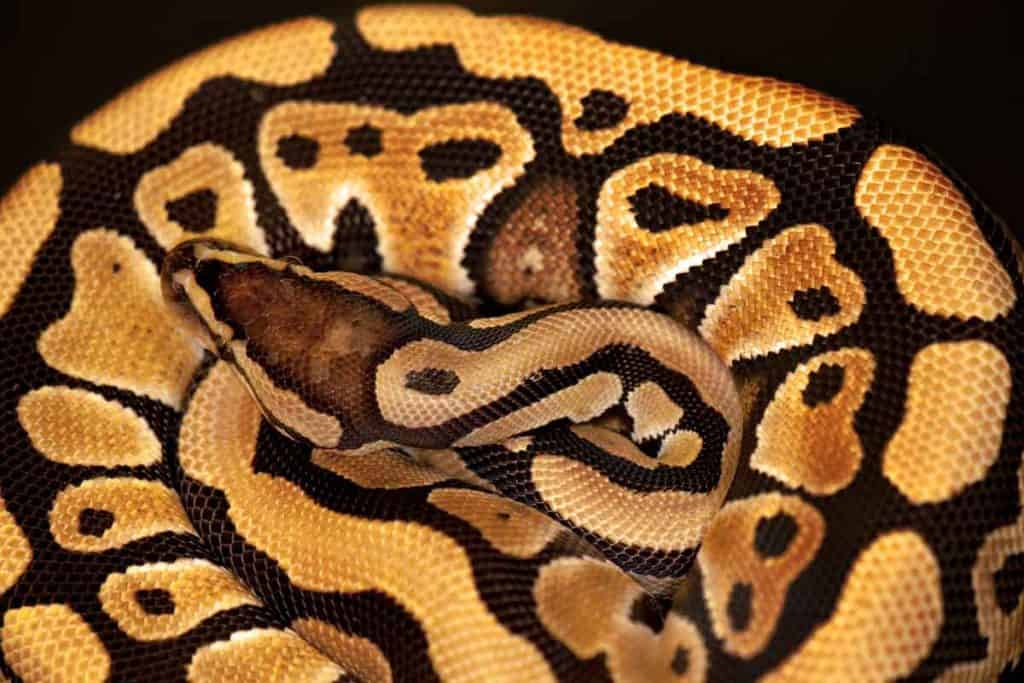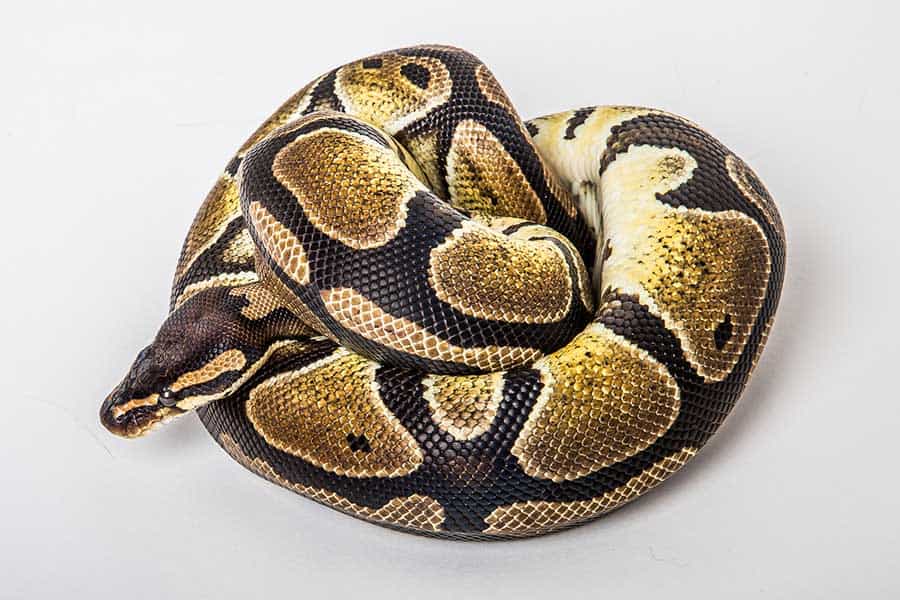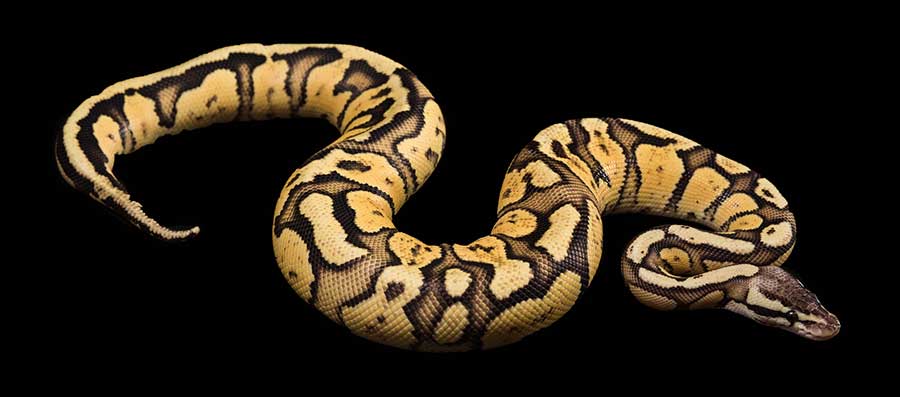Ball pythons (also known as royal pythons) are one of the most, if not the most popular pet snakes to own. You may have heard of how easy they are to keep and are thinking of getting one for yourself. Before you start searching for a reptile breeder, however, you need to know the answer to the question: how long do ball pythons live?
The main reason why it is so important to understand these snakes’ lifespans is because your ball python can grow up with you as a teenager, see the birth of your children, and possibly even the birth of your grandchildren!
With a lifespan that lasts a lot longer than most relationships, the ball python is a long-term commitment. As the owner, caretaker, and best friend of your ball python, you need to realize how much of a responsibility owning one will be.
These snakes are incredibly rewarding to keep and will be with you for a large portion of your life. Read on to find out how to keep them around as long as possible and live their best life next to their best human.
How Long Do Wild Ball Pythons Live?
Ball pythons come from central and western Africa. They are found in countries like The Democratic Republic of the Congo, Senegal, Congo, Cameroon, Uganda, and Chad. These warm, humid, tropical regions are the perfect home for these snakes.
In the wild, the average ball python lifespan is 20 years. This is because they are the smallest of the African pythons and suffer from heavy predation. Their natural predators include birds, other snakes, painted wolves (African wild dogs), and hyenas.
In addition to heavy natural predation, they suffer from severe habitat loss primarily due to humans destroying their environments to expand towns and cities.
How Long Do Ball Pythons Live in Captivity?
In captivity, ball pythons do not face the same natural pressures as they would in the wild like predation and habitat loss. This is mostly because pet ball pythons usually live in safe enclosures with very strictly controlled temperature and humidity settings. Therefore, their lifespan almost consistently doubles! You can expect your ball python to live for 30 to 40 years in captivity if they are taken care of properly.
Unfortunately, in captivity there are a few factors that can negatively affect your ball python’s lifespan. These aspects of their care must be closely monitored and controlled by you to prevent illness, injury, and stress in general.
Conversely, however, there are also things you can do that will help your ball python reach its full potential and live to a ripe old age–maybe even right alongside you!
3 Factors That Negatively Affect Ball Python Lifespan
As I touched on earlier, certain factors affect a ball python’s life span negatively. These factors are controlled by you, and you are responsible for ensuring that they are avoided at all cost.
1. Obesity
A chubby snake may be funny or cute-looking to the untrained eye. In reality, though, extreme obesity in animals is not amusing or cute at all. Obesity in snakes makes it especially painful for them to move around, makes it difficult for them to breathe, will cause organ failure, and eventually result in a premature death.
Obesity is often caused by honest beginners’ mistakes. Ball pythons can be very finicky when it comes to taking prey items and sometimes will go for long stints without eating. So, when they do start feeding, owners often make the mistake of overfeeding them.
Keep an eye on how much your ball python weighs with regular check-ins to monitor their weight.
If an obese ball python is not treated quickly and carefully, then they will die much sooner than they would have if they were a healthy weight.
2. Poor Husbandry
Poor husbandry can be broken down into enclosure maintenance and enclosure settings.
Maintaining your ball python’s habitat is essential to ensuring your ball python stays healthy and is not suffering from bacterial and fungal infections. Your ball python’s substrate needs to be spot cleaned daily of any poop or pee messes.
Check out our guides on how ball pythons poop and what is the best substrate to use for them!
Once a month the enclosure needs to be fully cleaned out and sanitized to ensure a hygienic environment for your snake.
Correct enclosure settings like temperature and humidity are also important. If your snake is too cold or too hot, they will become stressed and more susceptible to illness. Excess heat can also cause burns, while snakes that are too cold can have difficulty shedding and even eating properly.
3. Power Feeding
Power feeding is an unhealthy practice that some owners use to significantly increase the speed at which their snake grows to their maximum size.
While power feeding increases the size of the snake rapidly, it does decrease the amount of time your snake will be alive due to the immense stress it puts on the snake’s bones and muscles.
Check out our guide on how big ball pythons get and use it as a guide to keep track of your snake’s weight.
5 Tips to Improve Your Ball Python’s Lifespan
While your snake will have a maximum age limit that is predetermined by their genetics, there are some things that you can do to help them reach that maximum age! Here are some tips for ensuring your snake lives as long as possible.
1. Give Your Ball Python the Right Enclosure
Ball pythons are large snakes, and they need a healthy amount of exercise. A baby ball python can be kept in a 10-gallon enclosure. However, when it becomes a juvenile or subadult, it should be moved to a 20-gallon enclosure.
A small adult snake can be housed in a 30-gallon enclosure, but most adult females and large males should ideally be housed in 40-gallon (or larger) enclosures.
Keep in mind these are the minimum recommended sizes for enclosures. If you can afford the space, bigger is always better! The more floor space your ball python has to move around on, the more exercise it will get. This means it will develop healthy, strong muscles, bones, and organs!
2. Provide Your Ball Python with a Healthy Diet
Feeding your baby ball python once a week and your adult once every two weeks is the recommended schedule to stick to. Following a consistent feeding schedule allows your snake’s metabolism to become regulated, and it encourages your snake to gradually trust you as a food source and companion.
You should feed your ball python mice and rats that are frozen and thawed. The process of freezing the prey items kills off bacteria and parasites that may harm your snake. Feeding live prey can be unnecessarily dangerous, cruel, and stressful for both the prey animal and the snake.
Along with food, your ball python needs a healthy supply of fresh water to drink from and soak in. Dehydration is a quick killer for snakes. Read our guide on dehydration in snakes and our tips to avoid it!
3. Keep Your Ball Python Stress-Free
Stress is a major factor in shortening a snake’s lifespan. Keep your snake comfortable and happy by providing it with plenty of coverage and privacy in its enclosure. Your ball python should be able to get from one side of the enclosure to the other without being seen if they choose.
4. Handle Your Ball Python with Care
You should always wash your hands before (and after) handling your snake. Snake skin is very susceptible to bacterial and fungal infections. It is essential that you take every precaution when handling your snake to not infect them accidentally.
5. Enrich Your Ball Python’s Surroundings
Ball pythons are incredibly curious and need mental stimulation to encourage them to be active. Without enough stimulation, they become bored and will either stop eating or continue eating and stop moving around and become obese.
Change up your ball python’s surroundings slightly when you clean out its enclosure so it has different pathways to go through to get from one side of the enclosure to the other. You can also change up their substrates to a different texture or provide them with a box or new substrate to sniff around in. New decor like plants, rocks, and bridges can also provide additional enrichment.
FAQs on Ball Python Life Expectancy
How old was the oldest ball python?
Until 2020, the oldest ball python was a male that lived at the Philadelphia Zoo. He lived to be 47 years old!
However, in September of 2020, a 62-year old ball python female went on record to lay a clutch of eggs! This ball python was given to the Saint Louis Zoo in 1961 when she was approximately three years old.
Will taking my ball python to the vet extend its lifespan?
Taking your ball python to the vet for regular check ups is a good idea for many reasons. You go for check ups to the doctor and dentist because you want to live a long life, and your ball python needs the same kind of care, especially if you are not an experienced reptile owner.
Every two or three years, a trip to the vet will set your mind at ease that your ball python is healthy, and it helps your vet pick up anything potentially wrong with the snake in advance. Yearly vet check-ups are even better if you can afford it.
Finding a vet in your area that has experience with ball pythons is also essential if something goes wrong and your snake needs an emergency trip. Make sure your vet is reputable by checking their reviews online if possible.
Can my ball python outlive me?
The answer to this question depends on when you get your ball python and what age it is.
If you are a super cool 60-year-old grandma who has a passion for snakes, then there is a good chance that buying a ball python baby will mean that it outlives you. However, if you’re perhaps a college student or young adult and you buy a snake that’s already a few years old, chances are, it won’t outlive you.
Regardless of how old you or your snake are when you become best friends, the responsible thing to do would be to make sure there is someone you trust who will take care of your ball python, if your ball python does indeed outlive you.
This will ensure your scaly baby will continue to be loved and cherished even if you are not the one to do it.
Balling Up…
How long do ball pythons live? A very long time, actually! You’ll need to be prepared for a potentially very long-lived pet if you adopt one of these unique snakes.
Ball pythons live for 30 to 40 years on average in captivity. To encourage their long lifespan, you should ensure they have a large enough enclosure, encounter as little stress as possible, get a good amount of enrichment, live in a clean and healthy environment, and are carefully monitored during meal times.
Ball pythons are a long-term investment and often a pricey commitment, so make sure you are up for the task!




